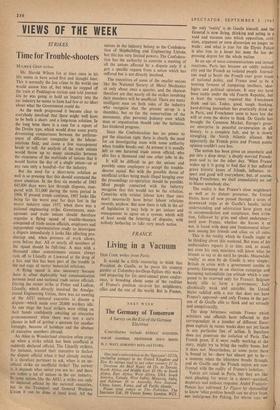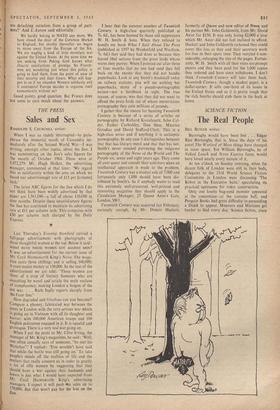FRANCE
Living in a Vacuum
DON COOK writes from Paris:.
It would be a little reassuring to think that President de Gaulle, as he paces his country garden at Colombey-les-Deux-Eglises this week- end preparing for his semi-annual press confer- ence, is brooding about some of the realities of France's position vis-d-vis her neighbours, allies and the rest of the world. But in France, the only 'reality' is de Gaulle himself, and the General is now living, thinking and acting in a void and vacuum into which opposition, criti- cism, argument or even discussion no longer in- trude: and what is true for the Elyse Palace is also true to a lesser but none the less de- pressing degree for the whole nation.
In an age of mass communications and instant reactions, Paris has become an oddly isolated city and the French an isolated people. Journal- ism used to bestir the French over great issues of national policy, and France used to be a teeming ferment of competing intellects, ideo- logies and political opinions. It may not have been stable under the old Fourth Republic, but at least the system required that Frenchmen think and act. Today, good, tough, thinking. hard-driving journalism has practically dried up in Paris, and Frenchmen seem to have lost the will or even the desire to think. De Gaulle has brought the Common Market, Europe's great- est enterprise in peaceful co-operation in all history, to a complete halt, and he is slowly strangling the North Atlantic alliance. But apparently the French press and French public opinion couldn't care less.
'The nation has been given an anaesthetic and put into a deep sleep,' a deeply worried French- man said to me the other day. 'When France wakes up it is going to find that it has suffered grave historic losses of friends, influence, re- spect and good will everywhere; but, of course, being Frenchmen, we shall immediately set out to blame somebody else.'
The reality is that France's close neighbours as well as its distant protector, the United States, have all now passed through a series of downward steps at de Gaulle's hands; initial understanding and admiration have given way to accommodation and acceptance, then irrita- tion, followed by grim and silent endurance— until now France, whether she knows it or not, is faced with deep and fundamental bitter- ness among her friends and allies on all sides.
This is the reality which de Gaulle ought to be thinking about this weekend. But none of his ambassadors reports it to him, and, as usual, not even his own ministers will know what he intends to say or do until he speaks. Meanwhile, 'reality' as seen by de Gaulle is very simple: Britain in crisis with a government unable to govern; Germany in an election campaign and becoming nationalistic (an attitude which is sup- posed to be reserved only for France); Belgium barely able to form a government; Italy chronically weak and unstable; the United States saddled with a war that does not have France's approval—and only France in the per- son of de Gaulle able to think and act serenely and unequivocally.
The deep bitterness outside France which ministers and officials have reflected to this correspondent in a number of different Euro- pean capitals in recent weeks does not yet focus in any particular line of action. It therefore does not penetrate the isolation of Paris. The French press, if it were really working, at the story, might try to bring the reality home, but it does not. Nevertheless, at some point there is bound to be—there has almost got to be— a moment when the bitterness breaks through, and de Gaulle and the French nation are con- fronted with the reality of France's isolation.
Voices are raised in Paris, but they are like men pleading for water in a desert—parched, desperate and without response. Andre Francois- Poncet has enlivened Le Figaro by demanding to know 'what positive benefit can we draw from our indulgence for Peking, for whose sake we
are detaching ourselves from a group of part- ners?' And L'Aurore said editorially: We hardly belong to NATO any more. We have closed the door of the Common Market to England, but shontly thereafter we began to move away from the Europe of the Six. We are waging a kind of little monetary war against the United States. At the same time we are seeking from Peking God knows what illusory satisfactions of prestige. So French- men are wondering just where this policy is going to lead them, from the point of view of their security and their future. What will hap- pen to us if we abandon Western solidarity and if continental Europe decides to organise itself economically without us?
Good points, good question. But France does not seem to care much about the answers.































 Previous page
Previous page